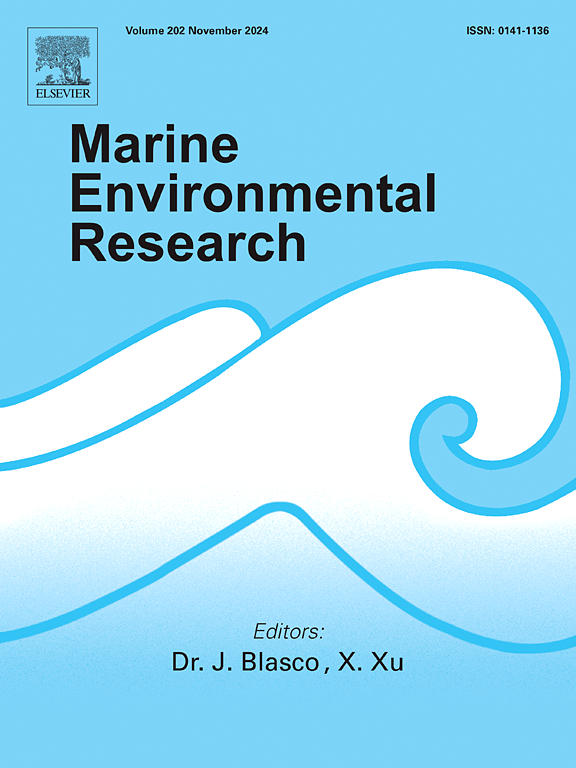Relationship between antibiotic resistance genes and microbiome in the Arctic marine sediments
IF 3.2
3区 环境科学与生态学
Q2 ENVIRONMENTAL SCIENCES
引用次数: 0
Abstract
The global dissemination of antibiotic resistance genes (ARGs) presents a significant threat to public health and ecosystems. The Arctic has been contaminated with ARGs due to the global spread of ARGs. However, the remote nature of the Arctic need a comprehensive characterization of the diversity and distribution of ARGs. In this study, ARGs and bacterial communities in marine sediments from the Arctic were analyzed using qPCR and 16s rRNA gene sequencing. The results indicated that the abundance of ARGs was correlated with the location of the sediments. The absolute abundance of target ARGs exhibited higher values in BJ2 and BJ3. Microbial community composition showed low similarity, with significant structural differences across samples. Proteobacteria was the dominant phylum in all sediment samples, with a large number of highly abundant unclassified genera present. Additionally, the Mantel test and correlation analyses revealed a significant relationship between the abundance of ARGs and bacterial communities. Acidobacteriota was identified as a potential host for sul1 and blaTEM. In summary, this study provides insights into the relationship between antibiotic resistance genes and microbiome in Arctic marine sediments and serves as an important reference for global ARGs management strategies.
北极海洋沉积物中抗生素耐药基因与微生物群的关系
抗生素耐药基因(ARGs)的全球传播对公共卫生和生态系统构成重大威胁。由于arg在全球的传播,北极地区已经被arg污染了。然而,北极的偏远性质需要对ARGs的多样性和分布进行全面的表征。本研究利用qPCR和16s rRNA基因测序对北极海洋沉积物中的ARGs和细菌群落进行了分析。结果表明,ARGs丰度与沉积物的位置有关。靶ARGs的绝对丰度在BJ2和BJ3中表现出较高的值。微生物群落组成相似性较低,不同样品间存在显著的结构差异。变形菌门是所有沉积物样品的优势门,存在大量高度丰富的未分类属。此外,Mantel测试和相关分析揭示了ARGs丰度与细菌群落之间的显著关系。酸杆菌群被确定为sul1和blaTEM的潜在宿主。综上所述,本研究为了解北极海洋沉积物中抗生素耐药基因与微生物组的关系提供了新的思路,为全球ARGs管理策略提供了重要参考。
本文章由计算机程序翻译,如有差异,请以英文原文为准。
求助全文
约1分钟内获得全文
求助全文
来源期刊

Marine environmental research
环境科学-毒理学
CiteScore
5.90
自引率
3.00%
发文量
217
审稿时长
46 days
期刊介绍:
Marine Environmental Research publishes original research papers on chemical, physical, and biological interactions in the oceans and coastal waters. The journal serves as a forum for new information on biology, chemistry, and toxicology and syntheses that advance understanding of marine environmental processes.
Submission of multidisciplinary studies is encouraged. Studies that utilize experimental approaches to clarify the roles of anthropogenic and natural causes of changes in marine ecosystems are especially welcome, as are those studies that represent new developments of a theoretical or conceptual aspect of marine science. All papers published in this journal are reviewed by qualified peers prior to acceptance and publication. Examples of topics considered to be appropriate for the journal include, but are not limited to, the following:
– The extent, persistence, and consequences of change and the recovery from such change in natural marine systems
– The biochemical, physiological, and ecological consequences of contaminants to marine organisms and ecosystems
– The biogeochemistry of naturally occurring and anthropogenic substances
– Models that describe and predict the above processes
– Monitoring studies, to the extent that their results provide new information on functional processes
– Methodological papers describing improved quantitative techniques for the marine sciences.
 求助内容:
求助内容: 应助结果提醒方式:
应助结果提醒方式:


